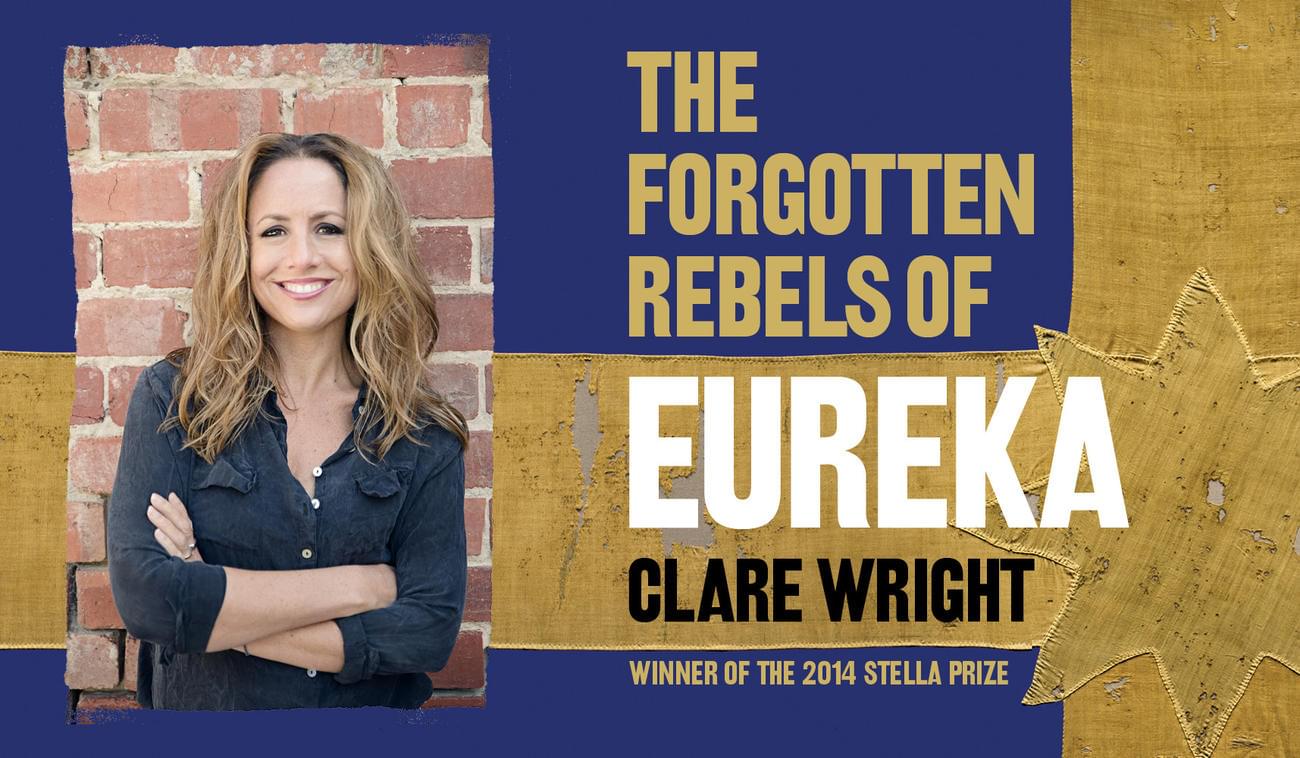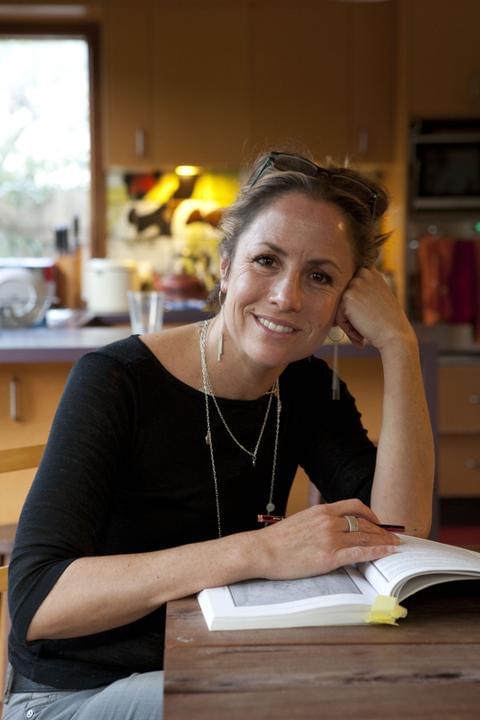
Dr Clare Wright’s Stella Prize-winning book The Forgotten Rebels of Eureka will be adapted for the small screen, after winning funding for the development of an eight-part television series.
La Trobe University is investing $200,000 for a pilot script and treatment for a drama series about the women of the Eureka Stockade. Hollywood screenwriter and producer Anne Kenney, whose credits include Outlander, ER and LA Law, is writing the pilot script. Clare will be co-producing the series and will be working as part of the creative team with Anne Kenney and Ruby Enteraintment.
‘I was intrigued by Clare Wright’s Rebels, and wanted to be a part of any television adaptation, from the moment I heard about it,’ Ms Kenney said.
Award-winning Australian producers Mark Ruse and Stephen Luby, of Melbourne-based production company Ruby Entertainment—who have produced Kath and Kim as well as another Text-published title, The Secret River by Kate Grenville—optioned the dramatic film and TV rights for La Trobe historian Dr Clare Wright’s book The Forgotten Rebels of Eureka in 2015.
Published in 2013, this book brought the barely acknowledged role of women in the Eureka Stockade to the attention of Australia. It’s the first book in Wright’s Democracy Trilogy. The second book, You Daughters of Freedom, is due out from Text in October 2018.
Text sat down with Dr Wright to ask her about her book, the series and what it means for those brave women rebels of Eureka.
Text Publishing (TP): I can’t help thinking of series like Against the Wind or All the Rivers Run...
Clare Wright (CW): Nope. Don’t do that. This is moving completely away from costume dramas like those. Think Outlander meets Deadwood. Outlander for the female-driven narrative and Deadwood for the mining frontier setting.
TP: This is exciting for everyone involved. Did you think there was a chance of this being made into a show when you first conceived the idea for the book?
CW: Not at all. When you first start writing a book you just hope there’s going to be a publisher. The Forgotten Rebels of Eureka took ten years to write, and at no point along the way was I thinking, ‘drama series, television show, film’. I wrote the first draft for Rebels, then put it away for two years because my funding ran out. Then I wrote and presented a television history documentary for the ABC called Utopia Girls. After that I went back to Rebels, and the experience of writing for television really influenced how I subsequently revised the manuscript. I had learnt so much about narrative and drama and character development. Academic historians don’t get taught to write in that way. They get taught how to write finely calibrated arguments – not stories. But while I knew I wanted to privilege the narrative in Rebels, I also had to stay true to the fundamental principles of writing historical non-fiction. You can’t make anything up, you’re always coming from an evidence-based angle. You can’t create interior lives for your characters (no matter what you suspect about them), and this is how history texts differ from historical novels. You can only go by what people have written about their lives from the primary sources. But the gold rush archive is incredibly rich so I was able to pack Rebels with the sort of details that make you feel like you are actually there in Ballarat in 1854. I’ve actually been told many readers that the book has a very cinematic style and people from Ballarat and surrounds have also said that the book has made them see their home town so differently, even though they’ve lived there their whole lives.
Popular histories, as opposed to academic histories, will often attribute feelings and emotions to people. As an academic historian, I can’t invent an inner life for my protagonists. I can speculate about their feelings and emotions, but I always need to tell my audience when I’m doing this. So what’s fun about turning Rebels into a fictional drama series is that I get to go to places with these characters that I couldn’t previously. Where I might have suspected that two people were in a room together at the same time but couldn’t write that due to lack of evidence, I can now not only put them firmly in a room together, but I can also get them to have sex – the shackles are off!
TP: What do you think Anne Kenney can bring to your book?
CW: (deep breath of admiration) Oh my God for me, personally, it’s a dream come true. I’ll admit I’m a massive Outlander fan, but in particular I really admire Anne’s writing. Her episodes were always my favourites. I think she’s a stunning writer: she gets women, she gets history and she infuses both with a level of nuance and complexity that is really rare and it’s a treasure. The Wedding episode of Outlander that she wrote is considered to be one the best hours of television ever written. It’s become iconic. If you haven’t seen Outlander, just go watch that one episode. Anne has an extraordinary gift for understanding the complexities of character, motivation and intimacy. She understands what makes women tick and what makes women and men tick together. I think it’s this quality that makes Anne such a perfect fit for the screen adaptation of Rebels. Although Rebels foregrounds women as historical actors, it does so in a way that gives men more complexity and motivation and psychological depth. It doesn’t discount men, it restores a level of humanity to the Eureka story so it’s not longer just a political caricature of redcoats versus miners. The fact is that when there are women back in the picture, the men are restored to being brothers, husbands, fathers and sons. And Anne is a writer who deeply understands these relationships, as well as the interrelationships between women and the men around them.
It’s also important to point out that although the Eureka Stockade is a key Australian foundation story, it’s also an international story. There were Americans at Eureka and they played an important role. There were people from around the globe: there were English, French, Irish, Scots, Germans, Chinese, and so on. The reason they created the Eureka flag, which was originally called the ‘Australian Flag’, and used the Southern Cross as its symbol, is because the constellation was the one thing that united the immigrant mining community, the thing they had in common. They were all living under the Southern Cross. I think Anne brings a sense of curiosity and wonder about what the rest of the world will find compelling in this story. We think of Eureka and we think ‘birth of Australian democracy’, but the Victorian gold rush is a significant part of world history and Anne brings that outside perspective.

Dr Wright, © Virginia Cummins
TP: How do you think the Rebels TV series will contribute to the current Australian discussion around women’s worth in society?
CW: The Eureka Stockade is a central component of the Australian national history curriculum, studied in Grade 5 and Year 9 (and again in VCE Australian History). Until now, the way this seminal event has been taught excluded almost a third of its participants: the women and children. ‘You can’t be what you can’t see,’ goes the saying. How many more history enthusiasts might we have if students could read themselves into the past? How many more female activists might we have if girls knew that women in the past were agitators, critics, risk-takers and rebels? And how many more boys might grow up to be men who respect women, if women’s past actions and ambitions were recognised, valued and rewarded? Those questions might seem like long bows to current issues around gender bias, sexual harassment and domestic violence, but I think the connections are there to be made. The way we tell stories about the past influences the way we think about our present.
TP: How much scope do you think there is now for other similar histories and stories?
CW: I hope the critical and commercial success of Rebels encourages other historians to write for broad audiences. I’m part of an academic community, so I know what great work and fantastic research is coming out of the Humanities in our universities. The challenge is about how to find other platforms to engage people and get that research out into mainstream society.
TP: The second book in your Democracy Trilogy is coming out in October. This covers ground around the Australian suffrage movement.
CW: Yes. So, You Daughters of Freedom follows the story of five women. The narrative is driven by the interweaving stories of these Australian women who went to fight as part of the British suffragette movement. And they were inspirational leaders to that movement because they had what the British women wanted: the vote. It foregrounds one of the linking themes in the trilogy: women as political activists, nation-builders and change-makers and people standing up to be counted. Another link for the trilogy is the material heritage of Australian democracy. The Eureka flag, the Commonwealth of Australia suffrage banner now displayed in Parliament House—and then, in the third book, I’ll cover the Yirrkala bark petitions of 1963. This is when Indigenous Australians were standing up to be counted, refusing to be left out of national decision-making.
TP: How important is getting these women’s voices onto the screen?
CW: It means everything to me. These women actually existed, they lived, they did these amazing things. It’s not made up. To me, one of the really poignant aspects of the historiography of Eureka is that the women of Ballarat knew they being written out of the story. By the 1880s, thirty years after the stockade happened, they could see themselves being erased. Narratives were being created about this ‘foundation movement’. Suddenly it was the ‘brave men of Eureka’ whose blood had stained the wattle. Women were in fact writing to newspapers and saying, ‘Hey, this is our story too.’ They lost that battle and it would be nearly 150 years later that their stories would start to be unearthed again.
For me, having their stories told on screen, rather than on the page, means that a much wider audience will be exposed to these women’s experiences and ambitions and actions. Tens of thousands of people will read the book, but millions will watch the television show. To be able to broadcast these stories to that kind of audience is a kind of historical justice. It’s about revising this foundation story but I also feel a kind of responsibility to these women who themselves knew they were getting shafted. We live in a screen culture and to have them in a series like this validates them and says that their stories are important to our culture and who we are. And I think that having these women’s stories on screen shows that if we value the women of the past in this way, we can and should value the women of today.
So keep your eyes peeled and ears open for what we completely and utterly expect to be a landmark Australian television series.
The Forgotten Rebels of Eureka is out now at all good bookshops, on the Text website (free postage), as an eBook and as an audio book. You Daughters of Freedom will be released 1st October, 2018.






